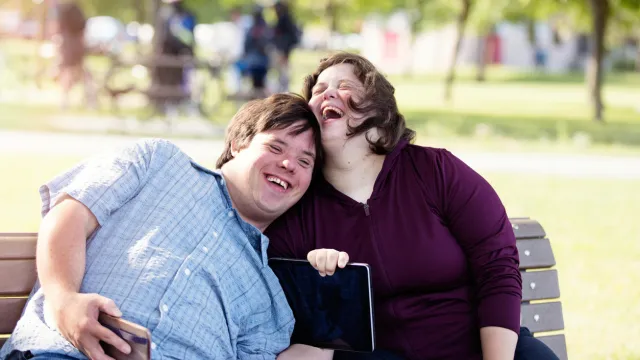We are passionate about making a difference for users and want to give people with special needs the chance to participate and be independent. Understanding the users and the needs of different diagnosis are essential when we design our products. Research studies provide strong evidence that Abilia´s cognitive assistive tools support users in structuring and managing their daily lives, taking control, and give increased confidence, independence and participation in daily living and working life.
What is a disability?
A disability refers to a reduced ability to function physically, mentally or intellectually. Disabilities can be of varying degrees of severity and they can affect life to different degrees. Some people are born with a disability, while others get them as a result of an illness or accident. They may last for a limited lime, or may be for life. Regardless of the background to the disability, everyone is entitled to an independent life involving interaction with the world around them. Abilia aims to create conditions for people with special needs, and we believe that everyone should have the same opportunities regardless of ability. We know from research that our aids can support people in their daily lives. Here you can read about different types of disability and how we can help you.
What is a cognitive disability?
Cognition is a psychological term referring to processes in the brain that control functions that help us to understand, store and use information. These functions include memory, learning, attentiveness, impulse control and imagination. If you have a cognitive disability, this means that the signals to the brain are being blocked rather than coordinated. You may have difficulty with social relationships, learning, concentration, understanding the time or writing and counting. Daily life often becomes confused and it can be hard to make any sense of it. This in turn can often lead to anxiety, and very often also to depression.
What is a communicative disability?
Communicative disabilities can be apparent in many different ways and can be dependent on changing circumstances. Some people are born with difficulties which prevent their speech developing naturally. It may be that you have difficulty keeping up with social interaction and expressing your feelings and needs in a way that other people understand. Some people are affected by something in life that causes them to lose their ability to speak. A disease or an accident can result in partial or complete loss of speech. Maybe the voice works, but it might be really weak, scarcely audible.
Whatever disability you have, most of us can take communication for granted, and the ability to communicate is important. It's a matter of expressing needs, preserving independence and personality, being able to have a conversation and taking the initiative.
Other disabilities
It is very common for people to suffer from various disabilities, large and small. For example, you might have impaired mobility that makes it difficult for you to move certain or major parts of your body, which can in turn affect cognition, perception, communication, the ability to move and coarse and fine motor skills. A lot of diagnoses can be from birth, or they may be the result of injury or disease.
If you have a disability, you may have difficulty coping with daily life by yourself, and you may be dependent on those around you or help. Depending on your level of disability, you may be faced with challenges on a daily basis, such as getting through doors, turning lights on and off, switching on the TV or just making a phone call. Perhaps you have a diagnosis that makes you feel insecure because you could have an attack at any time, or you might forget where you are and why you’re there. Sometimes the people closest to you might also be anxious for you and want to be told immediately if anything happens.



